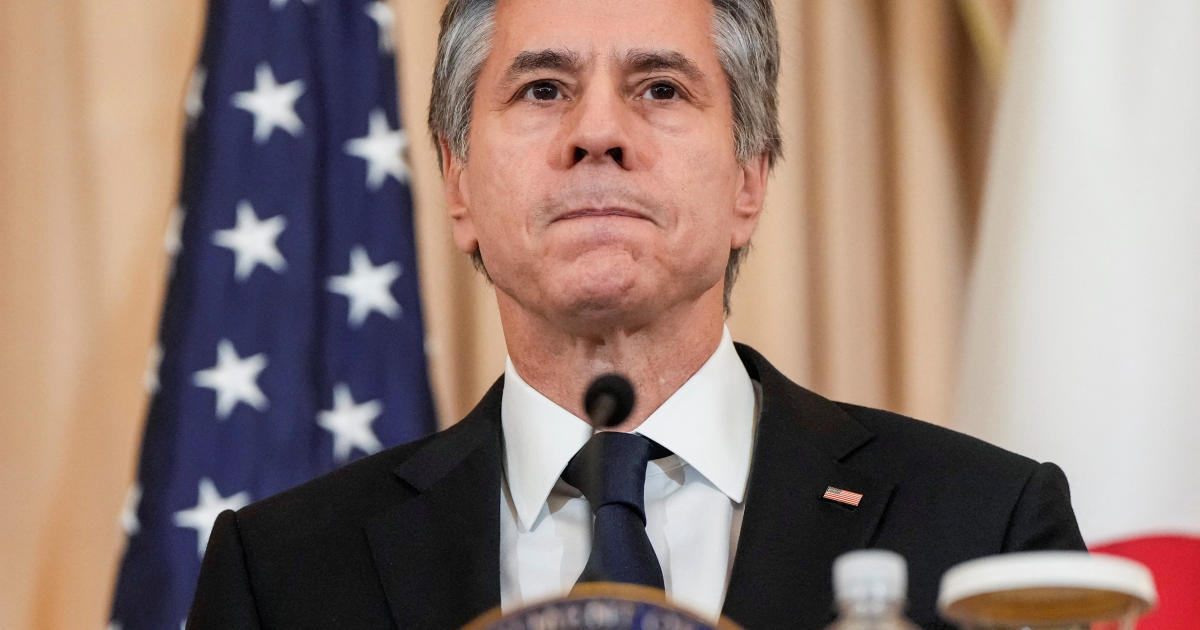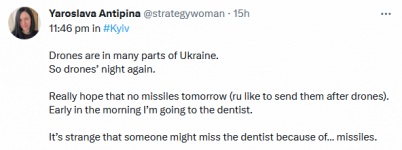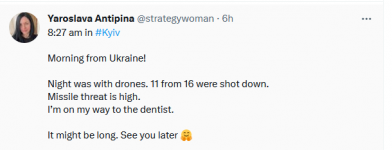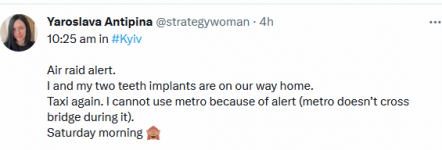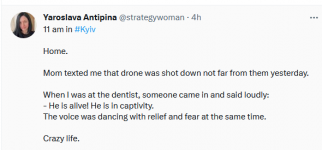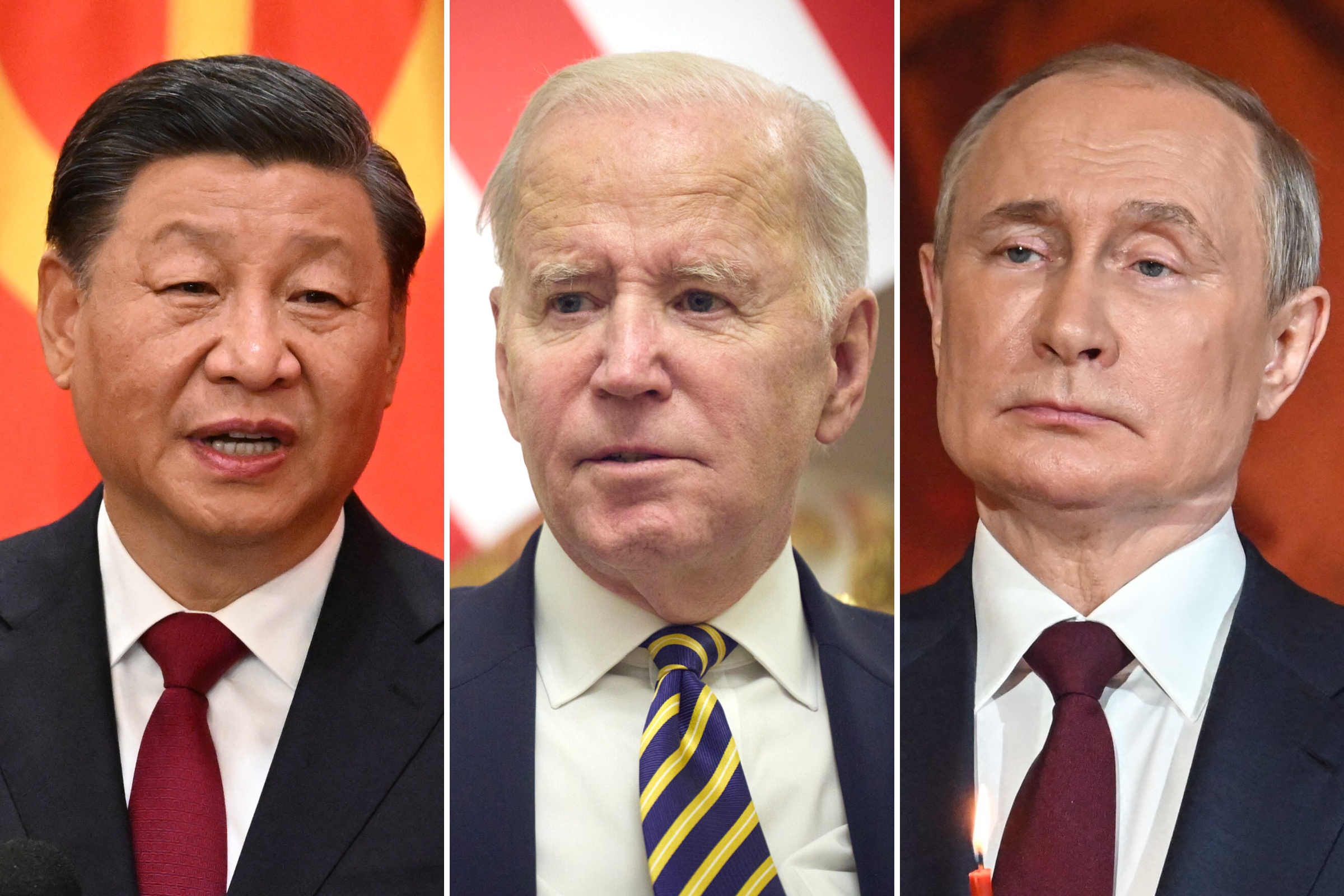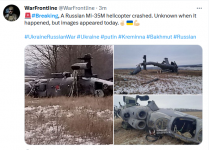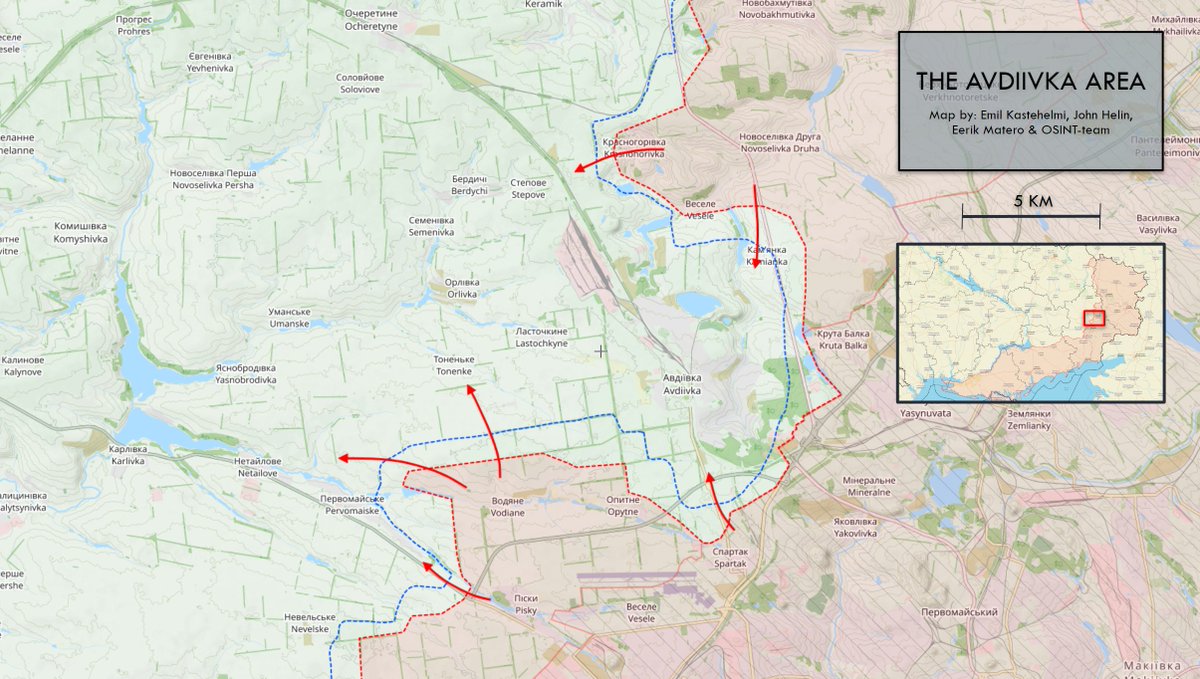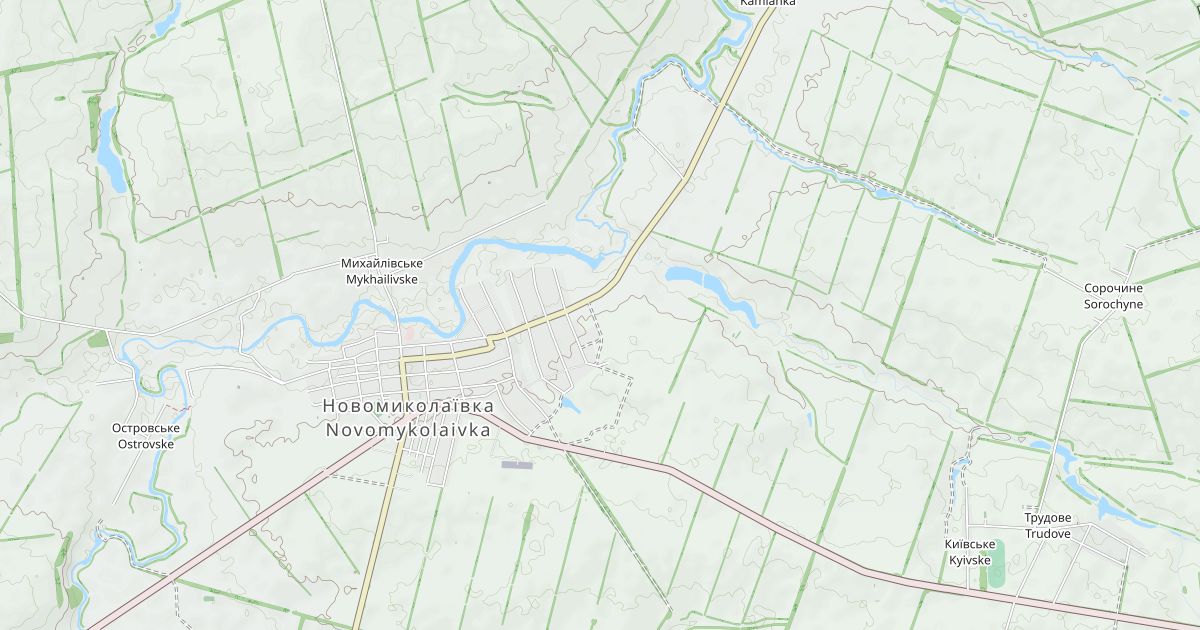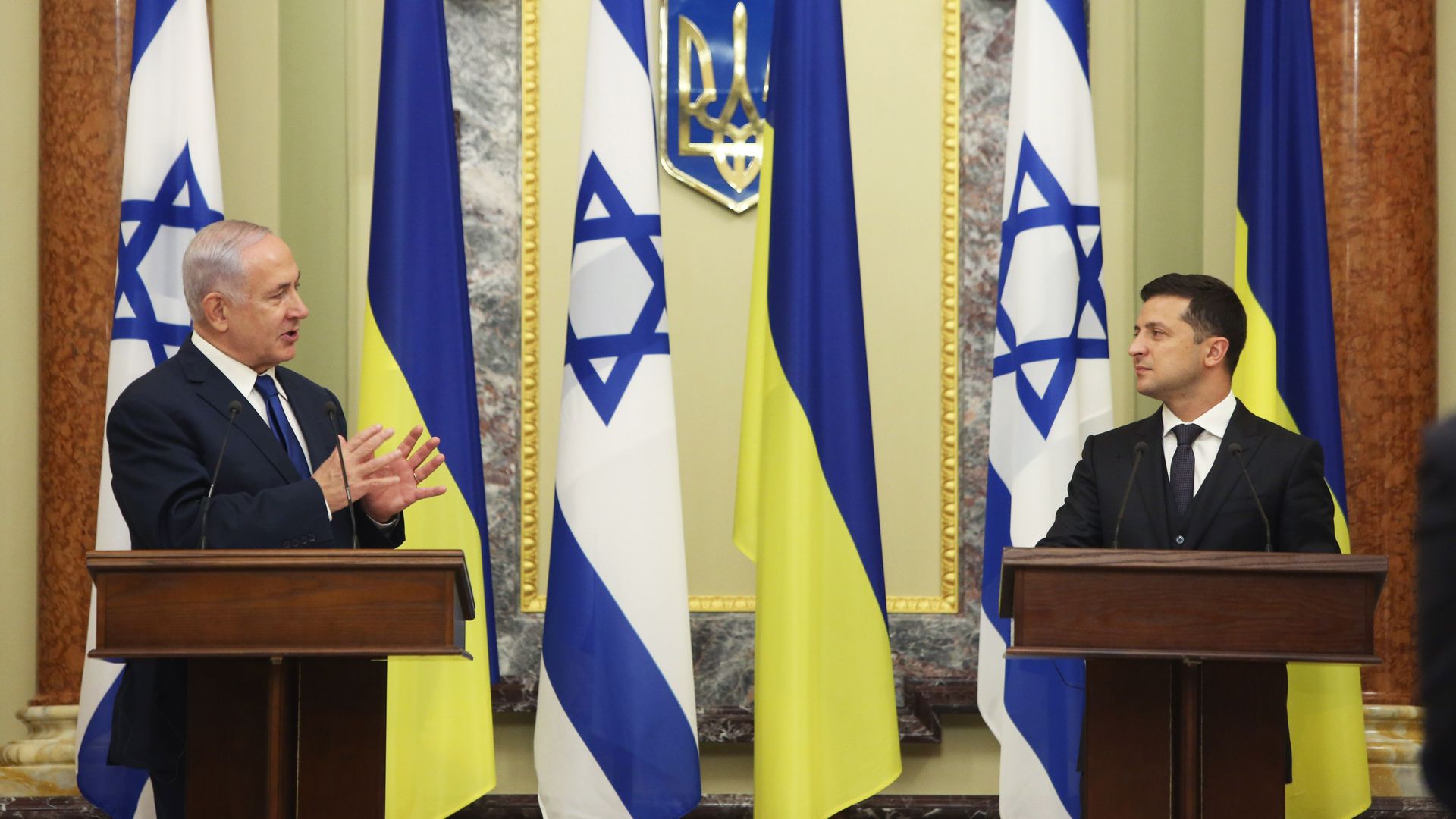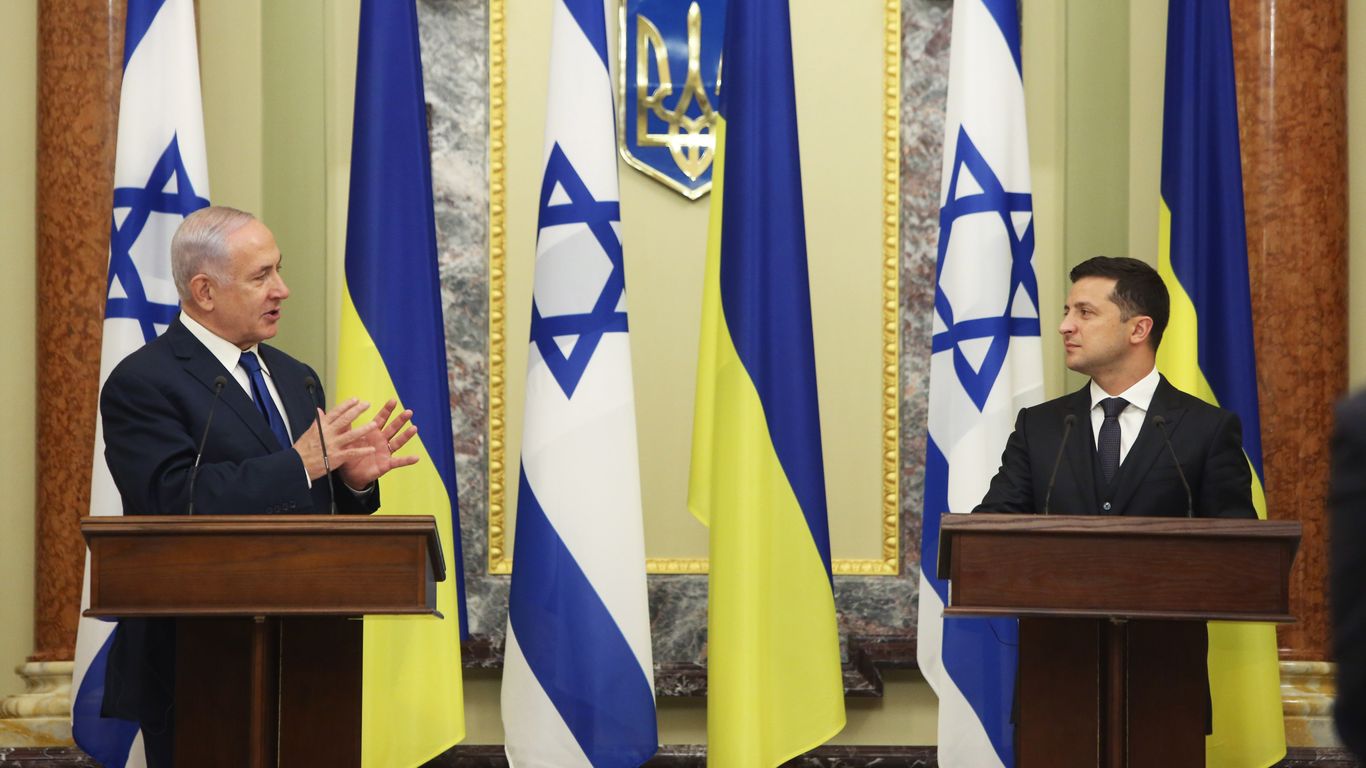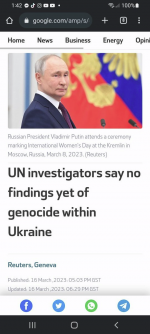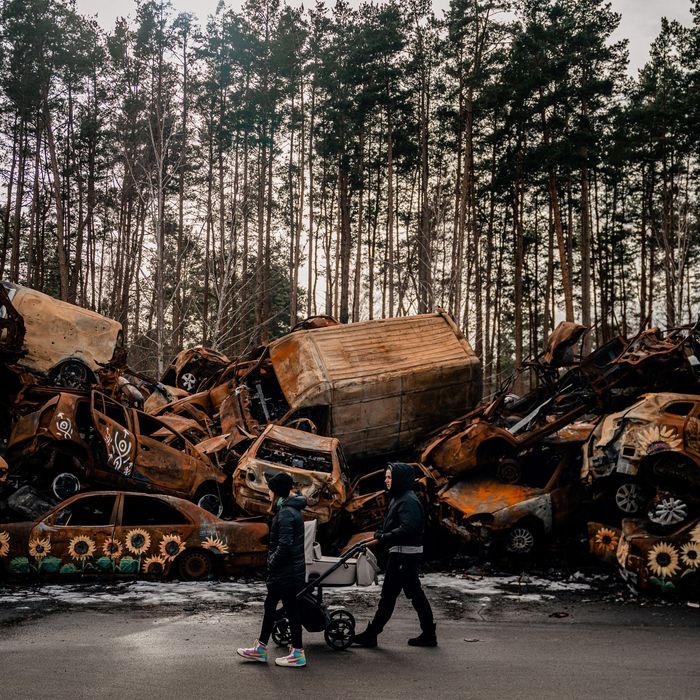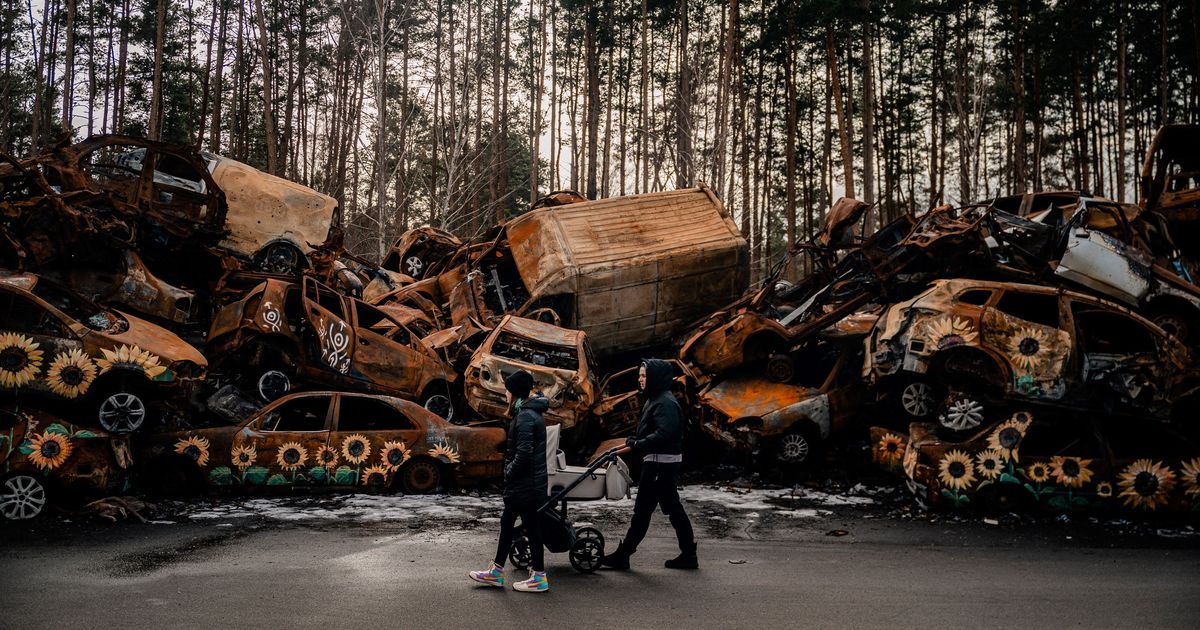hmm.
America Must Plan for a Stalemate in Ukraine
Eric Levitz
Photo: Dimitar Dilkoff/AFP via Getty Images
When Vladimir Putin launched his war of conquest against Ukraine last year, the Pentagon expected
Kyiv to fall within days. As Russian troops began advancing along four separate fronts, Western policy-makers readied plans to
punish Putin’s invasion, not to defeat it.
Their fatalism wasn’t hard to understand. Russia was three times as populous as Ukraine, and its economy was nearly nine times larger than its neighbor’s. Meanwhile, Ukraine’s fledgling democracy was bitterly divided and its president
deeply unpopular. From the Defense Department’s distant perch, it looked as though Volodymyr Zelenskyy’s nation lacked the manpower, economic might, and will to beat back Putin’s war machine.
It did not take long for Ukraine to embarrass the optimists in Moscow and pessimists in D.C. The Ukrainian army abruptly thwarted Russia’s Kyiv offensive, forcing Putin to scale back his war aims and inspiring the West to redouble its military and economic support for the Ukrainian cause. Over the ensuing months, conventional wisdom about the nation’s prospects fundamentally changed. Russia’s economy sagged from the weight of sanctions while its army bled men by the tens of thousands. Ukrainian counteroffensives liberated Kharkiv and Kherson, while the West ratcheted up the quality and quantity of its martial aid. Whereas Western analysts had once considered Ukraine incapable of retaining its own capital, by year’s end, some cast the
full reconquest of the country’s internationally recognized territories — from the Donbas down to Crimea — as a realistic condition for peace. More importantly, Ukrainian leadership reached the same conclusion. Or at least, faced with Russian atrocities in formerly occupied Ukrainian cities, Zelenskyy’s government came to regard any territorial concessions as politically unthinkable.
But now, a full year into the conflict, the realities that once led Washington to write off Ukraine have begun to reassert themselves. Since the onset of winter, battle lines have remained largely static, with Russia making incremental gains. A war of attrition has set in. And in several respects, Russia appears better positioned to pass such an endurance test.
Wars of attrition are tests of manpower, industrial capacity, and political will. Despite its heavy losses, Russia has
no shortage of men. Following its mobilization in October, Russia boasts more than 300,000 troops in Ukraine and hundreds of thousands of additional reserves. In total, Moscow commands a military force of an estimated 1.3 million. The Ukrainian military’s headcount is closer to 500,000.
The quality of Russia’s conscripted forces may not be high. But after a year of bleeding its best-trained professionals, the Ukrainian military faces similar problems. According to Western estimates, Ukraine has lost 120,000 troops to death or wounds. This has transformed the character of Ukraine’s forces, according to Ukrainian troops who spoke with the
Washington Post this week:
After a year of war, Kupol, a lieutenant colonel, said his battalion is unrecognizable. Of about 500 soldiers, roughly 100 were killed in action and another 400 wounded, leading to complete turnover. Kupol said he was the sole military professional in the battalion, and he described the struggle of leading a unit composed entirely of inexperienced troops.
“I get 100 new soldiers,” Kupol said. “They don’t give me any time to prepare them. They say, ‘Take them into the battle.’ They just drop everything and run. That’s it. Do you understand why? Because the soldier doesn’t shoot. I ask him why, and he says, ‘I’m afraid of the sound of the shot.’ And for some reason, he has never thrown a grenade.”
The
Post’s report also suggests that Ukraine is “suffering from basic shortages of ammunition, including artillery shells and mortar bombs.”
Russia’s stocks of martial hardware are comparatively deep. After much hesitation, Germany approved the transfer of Leopard 2 tanks to Ukraine last month. While those vehicles are more advanced than Russia’s tanks, the quantity being sent is all but “symbolic,” in the words of one Ukrainian government official who spoke with the
Post. More than one month after they were approved, only a few dozen Leopard 2s have made it into Ukraine. Russia’s tank fleet numbers in the thousands.
For its part, the U.S. has
already expended 13 years’ worth of Stinger anti-aircraft missiles and five years’ worth of Javelins on the Ukrainian cause. American military production has not come close to keeping pace with Kyiv’s demand for armaments, which has forced the U.S. to
delay arms shipments to Taiwan.
In the medium-term, the balance of armaments will be shaped by each side’s productive capacity. Contrary to Western hopes, sanctions have failed to incapacitate Russia’s economy, which is poised to grow this year. The same cannot be said of Ukraine’s. After falling by more than 30 percent in 2022, the nation’s GDP is now one-tenth that of Russia.
Of course, the collective economic might of the Western alliance dwarfs that of Putin’s petro-state. The combined GDP of the U.S., the U.K., and the European Union is roughly 28 times larger than Russia’s. Yet the EU and U.S. have together dedicated only about 0.3 percent of their combined GDP to the Ukrainian war effort, and even this has attracted some domestic opposition. As Daniel Gros of the Institute for European Policy-Making
calculates, given the lower costs of Russian manufacturing, the Kremlin would only need to spend between 4 and 6 percent of Russian GDP on the war to exceed the West’s present funding levels.
Which seems eminently feasible, since Putin’s war effort appears well insulated from any popular opposition. The Russian leader long sought to avoid mass conscription, apparently out of fear for its political consequences. But such anxieties now look misplaced. September’s mobilization did chase an estimated 700,000 Russians out of the country. But exiling an internationally mobile (and thus likely disproportionately liberal) and exceptionally war-resistant segment of the population served to strengthen Putin’s grip on power, whatever its long-term implications for the Russian economy. At the same time, the Kremlin has managed to concentrate the war’s burdens on the most disempowered parts of Russian society, such as ethnic minorities in provinces far from Moscow and Saint Petersburg. For now, Putin’s core constituency can weather a protracted conflict far more comfortably than Ukrainian civilians.
In the U.S., meanwhile, support for the Ukrainian cause shows some signs of erosion. Over the past year, the percentage of U.S. voters who believe that their country has provided “too much” support to Ukraine has climbed from 7 to 26 percent,
according to Pew Research. A
separate survey in February found a majority of Americans saying either that the U.S. should not send more weapons to Ukraine or that they had no opinion about the matter. In May 2022, that same poll found 60 percent support for arming Ukraine. More critically, opponents of sustained aid may boast power in excess of their numbers, as war-weary Republican House members appear to enjoy some veto power over what legislation Speaker Kevin McCarthy will put on the floor. Given this context, a dramatic increase in the scale and pace of Western arms transfers seems unlikely.
None of this means that Ukraine cannot possibly achieve a total victory. The reportedly low quality of Ukraine’s surviving forces could be misleading, as the nation is holding back some of its best fighters for an impending spring offensive. Further, the White House could theoretically heed the Washington
Post editorial board’s advice and drastically escalate support for the Ukrainian cause, providing Kyiv with advanced fighter jets and other offensive weapons. The Russian army’s morale could break; Ukraine’s greatest advantage in a war of attrition is that it is fighting for the freedom of its people rather than the whims of an autocrat. Putin could die.
Nevertheless, given the present balance of power, it seems far more likely that Ukraine will fail to retake the entirety of its rightful territory. That basic assessment is shared by
a wide range of analysts, including some in the Ukrainian military and many
sympathetic to its cause.
American policymakers must therefore give greater thought to how they can best advance both U.S. and Ukrainian interests in the event of a protracted stalemate. Which is to say, they must ask how a relatively just and timely peace can be achieved in the event that Ukraine fails to oust Russian forces from its territory.
The obstacles to securing a functional peace in the absence of Russian withdrawal are formidable. And in many cases, overcoming one obstacle to that outcome only fortifies another.
Ukraine will never know true justice. Nothing Russia does from this point forward can possibly make right all the misery that its invasion has wrought. The dead can’t be brought back to life. And a resolution that leaves Russia in control of some of Ukraine’s rightful territory will be unjust by definition.
Still, a resolution that enables Ukraine to enjoy sovereignty over the vast majority of its territory, economic viability, and geopolitical security would represent a national triumph, and constitute a foundation for a prosperous and peaceful future. It should be possible to satisfy those first two conditions without affecting any dramatic change in territorial control. Were Russia to conquer the entirety of Ukraine’s coastline, rendering the nation a landlocked country, its future economic prospects would be severely impaired. If Ukraine retains sovereignty over the territory it presently controls, however, the purely geographic impediments to its prosperity will not be significant.
Ukraine’s growth potential could be further enhanced by ascension to the European Union. In a
recent interview with
The New Yorker, the historian Stephen Kotkin suggests that Ukrainian victory might be beneficially redefined as a modest increase in its controlled territory combined with EU membership. After all, it was a
popular mobilization in favor of stronger economic ties with the EU that kicked off the Russia-Ukraine crisis in 2013.
If the prospect of EU membership might bolster Ukraine’s economic prospects, and mitigate Zelensky’s difficulty in selling de facto territorial concessions to the Ukrainian public, it could also make the third condition of a just peace harder to achieve. Ukraine will never be geopolitically secure without Russian acquiescence to its independence. Even if Ukraine did manage to conquer the entirety of its territory, Russia could continue terrorizing it from the other side of their 1,300-mile land border.
A just peace will therefore require Russian buy-in. One way to secure that is through deterrence. The extension of some form of security guarantee to Ukraine is a precondition for any diplomatic resolution of the conflict, but especially for one involving the forfeiture of Ukrainian territory. Kyiv will not strike a peace deal that effectively gives Russia time to rearm and then reinvade from a more proximate border.
And yet, absent his military’s utter defeat, it is difficult to imagine Putin consenting to a peace resolution that awards Ukraine both the equivalent of NATO protection against a future Russian invasion
and membership in the European Union. To the extent that Putin’s war has any rational basis, it is to prevent Ukraine from aligning militarily and economically with the West. And Putin has more reason to fear a Western-aligned Ukraine today than he did before his invasion. Relative to February 2022, the West is more hostile to his regime, his military is less powerful, and NATO is larger and more unified. It is possible that diplomats could craft a system of security guarantees that included non-Western powers, such as China. But the credibility of such guarantees would rest on the participation of the states that contributed to Ukraine’s defense in the present crisis.
At the same time, it is unclear what guarantees the West is prepared to offer. Before the current conflict, when the prospect of a full-scale Russian invasion of Ukraine seemed far-fetched, the U.S. and Europe were already reluctant to extend NATO protection to Ukraine for fear of ending up in a direct military confrontation with a nuclear superpower. Perhaps something short of a commitment to defend Ukraine against a future invasion, such as ongoing material support for its military, would satisfy Kyiv. But absent massive battlefield setbacks, it seems unlikely that Ukraine would resign itself to such meager protection.
All this underscores the difficulty of achieving a
timely peace. And yet the longer the war persists, the more lives it will take, and the more challenging Ukraine’s ultimate recovery will be. Further, given Russia’s potential advantages in a prolonged conflict, avoiding a long war may be a martial imperative.
In a
recent analysis of the impediments to near-term peace, Samuel Charap and Miranda Priebe of the Rand Corporation emphasize the dual problems of the combatants’ mutual optimism about the war’s future course and pessimism about the benefits of peace. So long as Putin believes that time is on his side, securing Russian recognition of Ukraine’s right to sovereignty and security will be impossible. Further, the bleaker the postwar world looks to Moscow, the less inclined it will be to find a path to peace.
To address the first problem, Charap and Priebe recommend that the U.S. enact a long-term plan for its military assistance to Ukraine, complete with “credible delivery schedules and clear capability implications.” If the durability of American support for the Ukrainian cause were guaranteed, then Russia would have less reason to believe that time is on its side.
At the same time, the U.S. could mitigate Russia’s pessimism about life after war by establishing explicit conditions for sanctions relief, thereby giving Putin’s regime more economic incentive to end its bloodletting.
Yet the authors acknowledge that any action that reduces Russian optimism about a prolonged war, and pessimism about peace, could have the opposite effect on Ukraine’s disposition. If future U.S. aid were assured, they suggest that Kyiv might grow unduly optimistic about its odds of total victory. At the same time, if Ukraine comes to believe that a peace agreement would afford Russia relief from sanctions, and therefore more economic might, Ukraine might be more inclined to fight on, for a fear of how a more prosperous Russia might menace it in the future.
To curb excessive Ukrainian optimism, Rand advises the U.S. to consider conditioning its long-term aid on Kyiv’s commitment to negotiations. To mitigate Ukraine’s fears of peace, meanwhile, they advise the U.S. to guarantee that military aid will continue even after the conflict, along with some form of security guarantee. Although when Charap and Priebe contemplate the details of the latter, they struggle to articulate an arrangement that would simultaneously satisfy Ukraine’s demand for security, Russia’s insistence on Ukrainian neutrality, and the West’s desire to avoid direct engagement in foreign conflicts. They’re ultimately left with the opaque suggestion, “Creative approaches could be considered that are not as binding as U.S. mutual defense treaties but greater than pledges to return to current levels of support in a future contingency.”
Thus the path to achieving a remotely just and timely peace, in the absence of Ukraine’s martial triumph, is not easy to discern. But the path to the full liberation of the Donbas and Crimea is no less obscure. In the estimate of some in Ukraine’s own military, the
success of its spring offensive is far from assured. Should that offensive fail, the White House will need to be prepared with a plan for resolving the myriad obstacles to winning Ukraine a modicum of postwar security and prosperity.
America Must Plan for a Stalemate in Ukraine
The odds of a total Ukrainian victory look increasingly slim.

nymag.com
